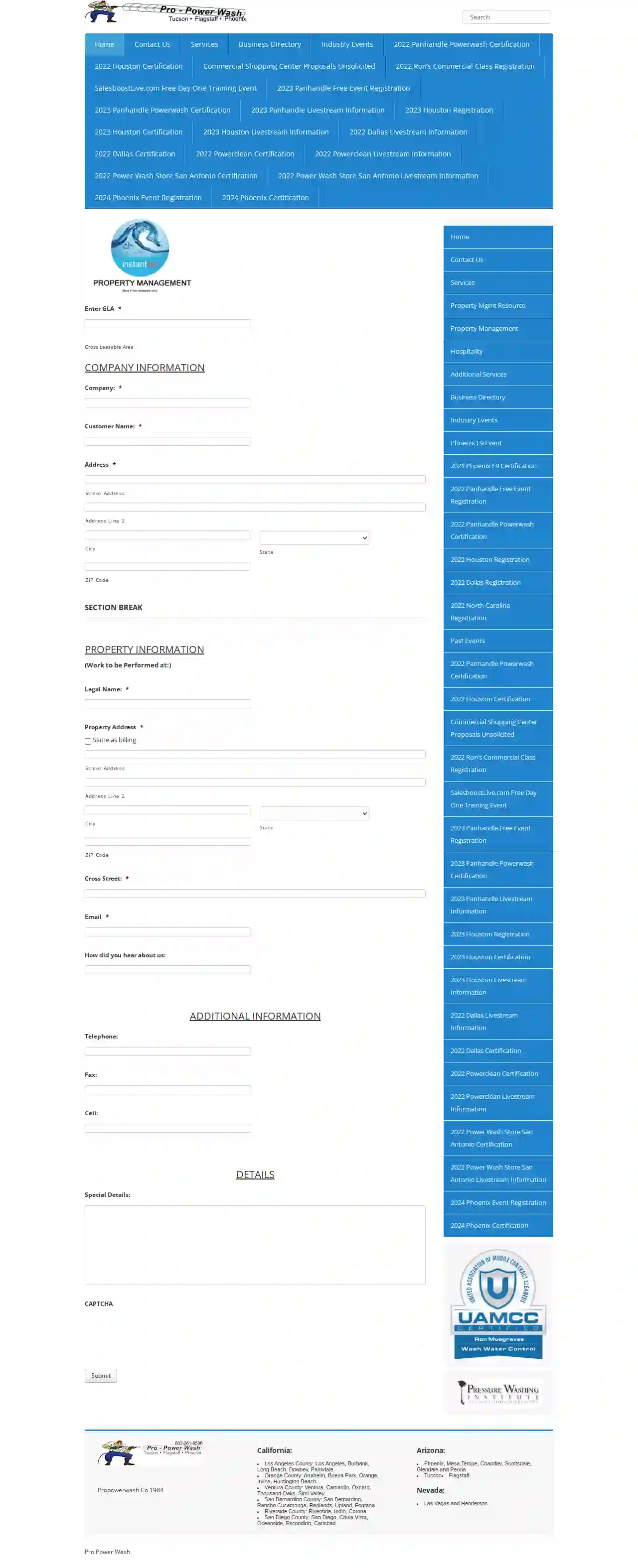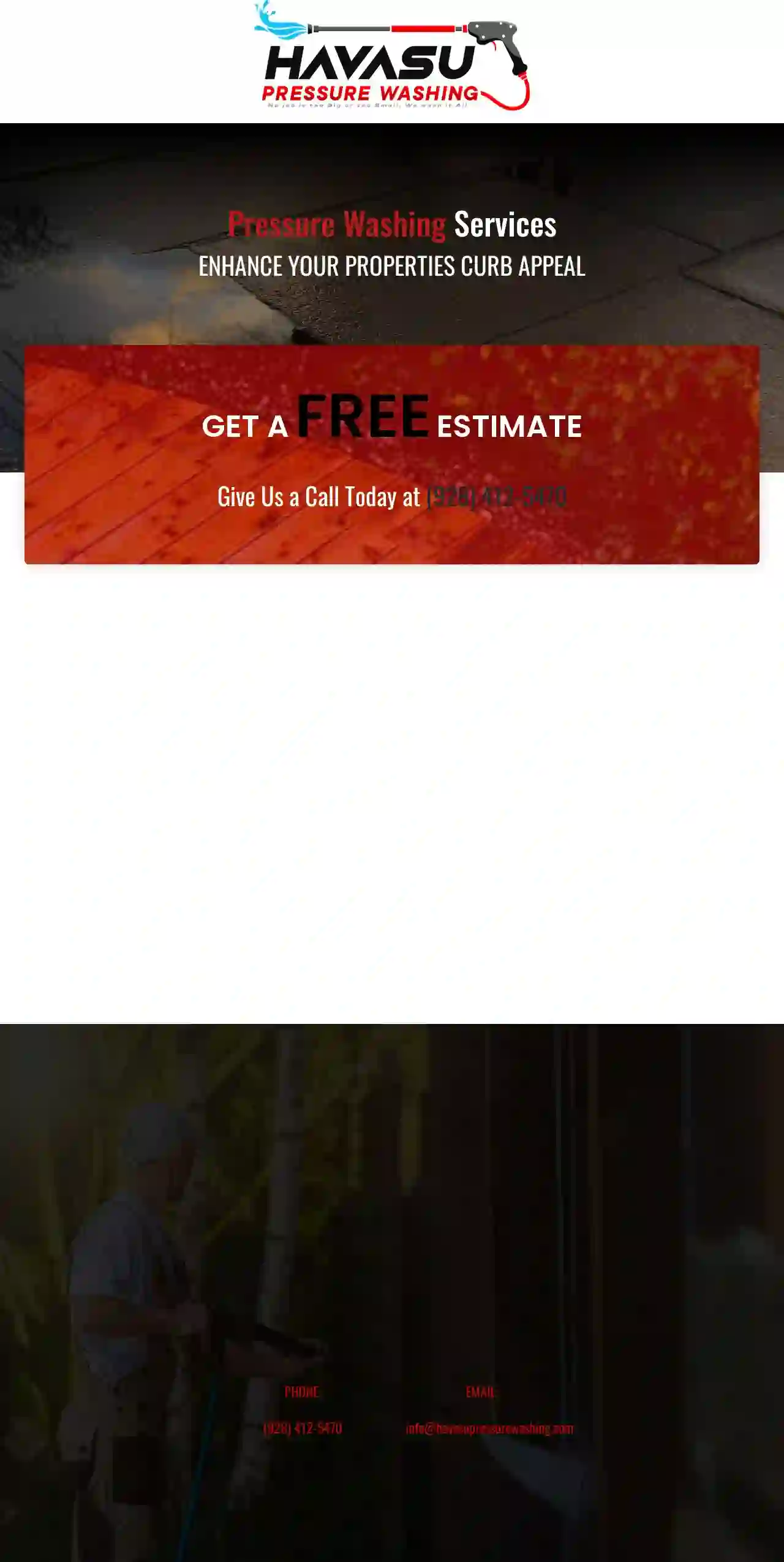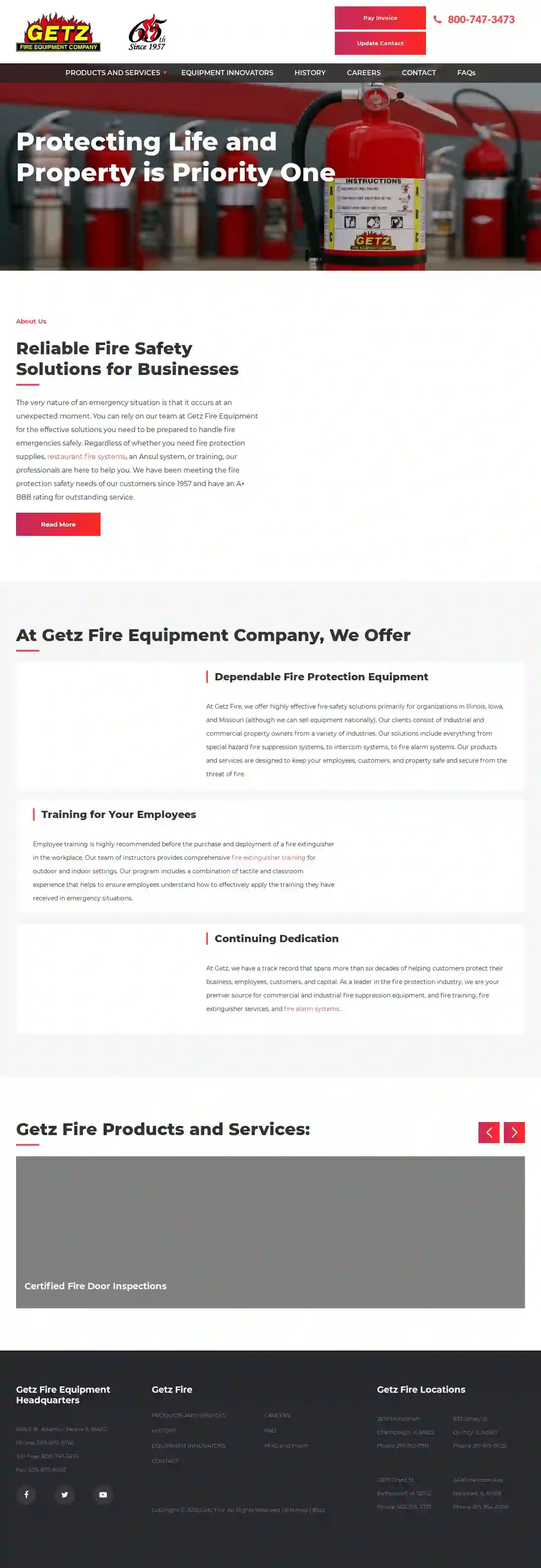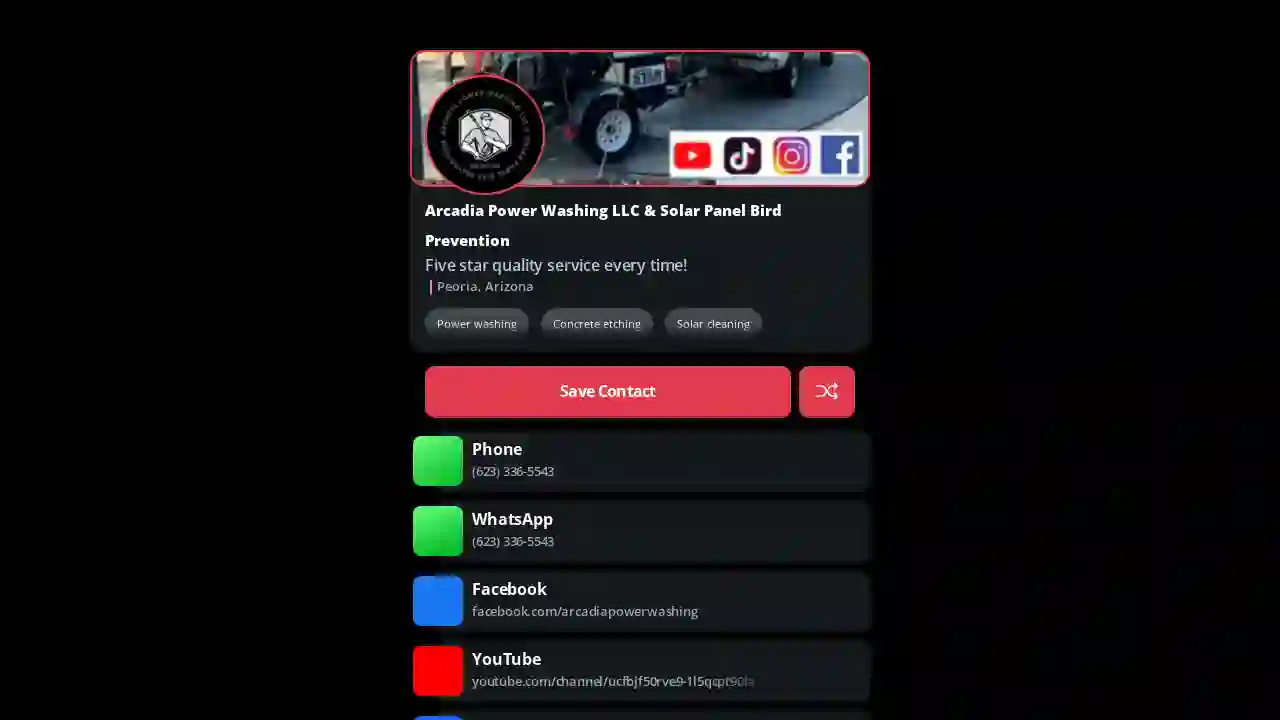Pressure Washing Douglas
Top 10 Power Washing in Douglas
Get up to 3 Commercial Pressure Washing quotes for your project today! Compare profiles, reviews, accreditations, portfolio, etc... and choose the best service.

Pro Powerwash
2.33 reviews1984, Los Angeles, 90001, USPro Power Wash is a leading provider of professional pressure washing services, serving both residential and commercial clients. Founded in 1984, the company has built a reputation for delivering high-quality, reliable service and exceeding customer expectations. With a team of experienced technicians and a commitment to using the latest equipment and techniques, Pro Power Wash offers a wide range of pressure washing solutions to meet the unique needs of each client. They service California, Arizona, Nevada and are dedicated to providing exceptional results that enhance the beauty and value of their clients' properties.
- Services
- Why Us?
- Accreditations
- Gallery
Get Quote
American Powerwash Pros LLC
4.714 reviewsPhoenix, USAmerican Powerwash Pros is a trusted power washing company serving the Phoenix metro area. We offer a range of services, including driveway cleaning, parking lot cleaning, pressure washing cleaning, window cleaning, paint removal, garage/parking cleaning, and more. Our team of professionals uses the latest equipment and cleaning solutions to provide high-quality pressure washing services for residential, commercial, and industrial clients. With a satisfaction guarantee and experienced professionals, we are the go-to choice for all your power washing needs.
- Services
- Why Us?
- Gallery
Get Quote
Havasu pressure washing
53 reviewsPhoenix, USHavasu Pressure Washing offers three types of services: pressure washing, power washing, and soft washing. They service both residential and commercial properties, aiming to enhance curb appeal and make a lasting first impression. Their team provides high-quality cleaning for driveways, patios, roofs, and more, ensuring a safe and effective cleaning process. For a free quote, contact Havasu Pressure Washing today.
- Services
- Why Us?
- Gallery
Get Quote
Soft Hands Pressure Washing
515 reviewsPhoenix, AZ, 123 Main St, 85260, USSoft Hands Pressure Washing is Arizona's premier pressure washing service provider. With years of experience and a commitment to excellence, we offer a wide range of services to residential and commercial clients. Our team of experts uses the latest equipment and techniques to provide top-notch cleaning solutions for driveways, decks, patios, and more. Contact us today to schedule your appointment and experience the Soft Hands difference!
- Services
- Why Us?
- Accreditations
- Our Team
- Testimonials
- Gallery
Get Quote
Dakota Power Washing
4.940 reviews9802 W El Caminito Dr, Peoria, Arizona, 85345, USDakota Power Washing provides pressure washing services in Peoria, Phoenix, and surrounding cities. We offer natural stone, concrete, paver sealing services, and professional power washing. We clean heavy equipment, vehicle fleets, homes, roofing systems, warehouses, industrial buildings, driveways, sidewalks, and all other stone and concrete surfaces.
- Services
- Why Us?
- Accreditations
- Our Team
- Testimonials
- Gallery
Get Quote
Aqua Wash Specialists, LLC
Buckeye, USWelcome to Aqua Wash Specialists, where we prioritize customer satisfaction and go beyond expectations to make your surroundings a better place. We are kind, honest, efficient, and believe that maintaining a clean property is essential. Our professionals are trained and equipped to handle any job, from driveways to houses and lots in between. We use high-quality equipment to deal with the tasks. We tailor our services to your specific needs and take pride in our work. We participate in community events to make a positive impact. We also donate our services regularly to elect individuals to bless their days. We are licensed and insured. The team has gone through an intense training. Contact us today to experience the best pressure washing or soft washing services in your area!!!😊
- Services
- Why Us?
- Testimonials
- Gallery
Get Quote
Copper State Pressure LLC
530 reviewsPhoenix, 85048-7438, USCopper State Pressure LLC is a pressure washing company serving the entire Phoenix Metro Area. We specialize in providing high-quality pressure washing services for residential, commercial, and industrial clients. Our team of experienced professionals uses the latest equipment and techniques to deliver outstanding results. We offer a wide range of services, including roof cleaning, soft washing, window cleaning, gutter cleaning, driveway cleaning, deck cleaning, graffiti removal, chewing gum removal, heavy equipment washing, and more. We are committed to providing our clients with exceptional service and value.
- Services
- Why Us?
- Gallery
Get Quote
AquaSurge Pressure Washing
59 reviewsPeoria, USAquaSurge's mission is to be the trusted guardian of your property's appearance, providing a seamless, convenient, and rewarding pressure washing experience. We strive to bring an unrivaled sparkle to your property, maintaining an unwavering commitment to top-tier quality, transparent pricing, and dedicated customer service. We are more than a service provider; we are your partner in property care. We uphold a transparency and robust communication philosophy that fosters confidence and trust in our services. We believe in empowering our customers with clear, honest information about our procedures, pricing, and results. At AquaSurge, every client interaction is an opportunity to demonstrate our commitment to customer satisfaction. Our skilled, personable team will always go the extra mile to accommodate your unique needs and ensure your experience with us is effortless and enjoyable. Sincerely, Brant Adreon, Co-Founder & CEO
- Services
- Why Us?
- Gallery
Get Quote
Getz Industrial
39 reviews1615 S.W. Adams, Peoria, IL, 61602, USGetz Fire Equipment Company has been serving the fire protection needs of businesses since 1957. We are a leader in the fire protection industry, offering a wide range of fire suppression equipment, training, and services. Our team of experts is dedicated to helping our clients protect their business, employees, customers, and capital. We offer a variety of fire protection solutions, including fire extinguishers, fire alarm systems, fire sprinkler inspection services, and more. We also provide comprehensive fire extinguisher training for both indoor and outdoor settings. Our goal is to provide our clients with the peace of mind that comes with knowing they have the best possible fire protection in place.
- Services
- Why Us?
- Accreditations
- Gallery
Get Quote
Arcadia Power Washing LLC
5105 reviews1000 E Duarte Rd, Suite 100, Arcadia, 91006, USArcadia Power Washing LLC is a locally owned and operated power washing company serving the greater Arcadia, CA area. We are dedicated to providing high-quality, professional power washing services to both residential and commercial clients. Our team of experienced technicians uses the latest equipment and techniques to ensure that your property is cleaned thoroughly and safely. We offer a wide range of services, including house washing, driveway washing, deck washing, fence washing, and more. We are committed to providing our clients with exceptional service and results. Contact us today for a free estimate!
- Services
- Why Us?
Get Quote
Over 60,241+ Janitorial Services onboarded
Our janitorial service providers operate in Douglas and surrounding areas!
CleaningMatch has curated and vetted Top Cleaning Services arround Douglas. Find the most trustworthy business today.
Frequently Asked Questions About Pressure Washing
- Reputation and Reviews: Check online reviews and ask for referrals to gauge the company's reputation and customer satisfaction.
- Experience and Expertise: Look for a company with a proven track record and experience in pressure washing various surfaces.
- Licensing and Insurance: Ensure the company is licensed and insured to protect you from liability.
- Equipment and Techniques: Inquire about the company's equipment and techniques to ensure they use appropriate pressure levels and cleaning solutions.
- Quotes and Pricing: Obtain detailed quotes that outline all services and costs.
- Professionalism and Communication: Choose a company that is responsive, communicative, and professional.
- Size of the Area: Larger areas generally cost more to pressure wash than smaller ones.
- Type of Surface: Different surfaces require different pressure levels and cleaning solutions, which can affect pricing.
- Condition of the Surface: Heavily soiled or stained surfaces may require more time and effort to clean, impacting cost.
- Accessibility: Difficult-to-reach areas may require specialized equipment and increase costs.
- Additional Services: Services like pre-treating stains, applying protective coatings, or mold removal may incur additional charges.
- Experience and Expertise: Professionals have the knowledge and skills to choose the right pressure levels and cleaning solutions for different surfaces, minimizing the risk of damage.
- Professional Equipment: Pressure washing companies use commercial-grade equipment that is more powerful and efficient than consumer-grade pressure washers.
- Safety: Pressure washing can be hazardous, especially when working on ladders or with high-pressure water. Professionals are trained in safety procedures and have the necessary equipment to work safely.
- Time-Saving: Pressure washing can be time-consuming, especially for larger projects. Hiring professionals frees up your time for other tasks.
- Cover or Shield Plants: Before pressure washing, cover or shield delicate plants and landscaping with tarps, plastic sheeting, or painter's tape to protect them from water spray and chemicals.
- Use Lower Pressure Settings: If pressure washing near plants, use lower pressure settings and avoid directing the spray directly at them.
- Rinse Plants with Water: After pressure washing, rinse plants thoroughly with plain water to dilute any chemicals that may have landed on them.
- Choose Plant-Safe Cleaning Solutions: If using cleaning solutions, opt for environmentally friendly or plant-safe options whenever possible.
What should I look for in a pressure washing company?
A reputable pressure washing company will prioritize safety, use appropriate cleaning methods, and provide excellent customer service.
How much does pressure washing cost?
To get accurate pricing, request quotes from multiple pressure washing companies. Provide details about the size and type of surface, its condition, and any additional services you require.
Can I pressure wash my own house?
If you're considering DIY pressure washing, assess the complexity of the project, your experience, and the risks involved. For larger or more challenging projects, hiring professionals is often a wiser and safer choice.
Can pressure washing damage my plants?
Taking these precautions minimizes the risk of damage to your plants and landscaping during pressure washing.
What should I look for in a pressure washing company?
- Reputation and Reviews: Check online reviews and ask for referrals to gauge the company's reputation and customer satisfaction.
- Experience and Expertise: Look for a company with a proven track record and experience in pressure washing various surfaces.
- Licensing and Insurance: Ensure the company is licensed and insured to protect you from liability.
- Equipment and Techniques: Inquire about the company's equipment and techniques to ensure they use appropriate pressure levels and cleaning solutions.
- Quotes and Pricing: Obtain detailed quotes that outline all services and costs.
- Professionalism and Communication: Choose a company that is responsive, communicative, and professional.
A reputable pressure washing company will prioritize safety, use appropriate cleaning methods, and provide excellent customer service.
How much does pressure washing cost?
- Size of the Area: Larger areas generally cost more to pressure wash than smaller ones.
- Type of Surface: Different surfaces require different pressure levels and cleaning solutions, which can affect pricing.
- Condition of the Surface: Heavily soiled or stained surfaces may require more time and effort to clean, impacting cost.
- Accessibility: Difficult-to-reach areas may require specialized equipment and increase costs.
- Additional Services: Services like pre-treating stains, applying protective coatings, or mold removal may incur additional charges.
To get accurate pricing, request quotes from multiple pressure washing companies. Provide details about the size and type of surface, its condition, and any additional services you require.
Can I pressure wash my own house?
- Experience and Expertise: Professionals have the knowledge and skills to choose the right pressure levels and cleaning solutions for different surfaces, minimizing the risk of damage.
- Professional Equipment: Pressure washing companies use commercial-grade equipment that is more powerful and efficient than consumer-grade pressure washers.
- Safety: Pressure washing can be hazardous, especially when working on ladders or with high-pressure water. Professionals are trained in safety procedures and have the necessary equipment to work safely.
- Time-Saving: Pressure washing can be time-consuming, especially for larger projects. Hiring professionals frees up your time for other tasks.
If you're considering DIY pressure washing, assess the complexity of the project, your experience, and the risks involved. For larger or more challenging projects, hiring professionals is often a wiser and safer choice.
Can pressure washing damage my plants?
- Cover or Shield Plants: Before pressure washing, cover or shield delicate plants and landscaping with tarps, plastic sheeting, or painter's tape to protect them from water spray and chemicals.
- Use Lower Pressure Settings: If pressure washing near plants, use lower pressure settings and avoid directing the spray directly at them.
- Rinse Plants with Water: After pressure washing, rinse plants thoroughly with plain water to dilute any chemicals that may have landed on them.
- Choose Plant-Safe Cleaning Solutions: If using cleaning solutions, opt for environmentally friendly or plant-safe options whenever possible.
Taking these precautions minimizes the risk of damage to your plants and landscaping during pressure washing.